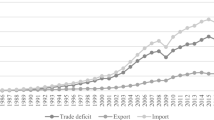Abstract
The European Union (EU) and the United States are the world's largest and most-interconnected economies. In the 1990s, they engaged in a series of joint initiatives designed further to liberalise the transatlantic marketplace through cooperation in trade and regulatory matters, including pursuant to the 1995 New Transatlantic Agenda. From 2000 to 2004, however, political tensions between the US and Europe intensified, as conflicts arose over the war in Iraq, the International Criminal Court, and the Kyoto Protocol, triggering fears that political turmoil could disrupt the mutually beneficial transatlantic economic relationship. Despite the political challenges, the transatlantic economic relationship has demonstrated extraordinary continuity and resilience amid the discord. The US/EU economic relationship has been subject to intensive disputes in areas such as steel, airplanes, and genetically modified foods, but there is little sign that the election of George W. Bush or the 2003 invasion of Iraq was responsible for these tensions, which arose primarily from pre-existing divergent domestic political pressures. This relative insulation of the economic relationship from the dispute over the Iraq war, however, does not imply that power politics is unimportant in the economic realm, and indeed we argue that outcomes in the economic realm are shaped significantly by differences in US and EU market and institutional power in different sectors.
Similar content being viewed by others
References
Andrews, D., Pollack, M.A., Shaffer, G.C. and Wallace, H. (eds.) (2005) The New Transatlantic Agenda and the Future of Transatlantic Economic Governance, Florence: European University Institute.
Bermann, G., Herdegen, M. and Lindstreth, P. (eds.) (2001) Transatlantic Regulatory Co-Operation: Legal Problems and Political Prospects, New York: Oxford University Press.
Hamilton, D.S. and Quinlan, J.P. (2005) ‘Partners in Prosperity: The Changing Geography of the Transatlantic Economy’, in D. Andrews, M.A. Pollack, G.C. Shaffer and H. Wallace (eds.) The New Transatlantic Agenda and the Future of Transatlantic Economic Governance, Florence: European University Institute, pp. 9–34.
Kovacic, W.E. (2005) ‘Competition Policy Cooperation and the Pursuit of Better Practices’, in D. Andrews, M.A. Pollack, G.C. Shaffer and H. Wallace (eds.) The New Transatlantic Agenda and the Future of Transatlantic Economic Governance, Florence: European University Institute, pp. 65–80.
Nicolaidis, K. and Steffenson, R. (2005) ‘Managed Mutual Recognition and the Transatlantic Marketplace’, in D. Andrews, M.A. Pollack, G.C. Shaffer and H. Wallace (eds.) The New Transatlantic Agenda and the Future of Transatlantic Economic Governance, Florence: European University Institute, pp. 139–163.
Peterson, J. and Pollack, M.A. (eds.) (2003) Europe, America, Bush: Transatlantic Relations in the 21st Century, London: Routledge.
Philippart, E. and Winand, P. (2001) ‘Deeds Not Words? Evaluating and Explaining the US–EU Policy Output’, in E. Philippart and P. Winand (eds.) Ever Closer Partnership: Policymaking in US–EU Relations, Brussels: Peter Lang, pp. 431–463.
Pollack, M.A. and Shaffer, G.C. (eds.) (2001) Transatlantic Relations in the Global Economy, Lanham, MD: Rowman & Littlefield.
Posner, E. (2005) ‘Market Power without a Single Market: The New Transatlantic Relations in Financial Services’, in D. Andrews, M.A. Pollack, G.C. Shaffer and H. Wallace (eds.) The New Transatlantic Agenda and the Future of Transatlantic Economic Governance, Florence: European University Institute, pp. 233–268.
Pérez Asinari, M.V. and Poullet, Y. (2005) ‘Privacy, Personal Data Protection and the Safe Harbour Decision: From Euphoria to Policy, from Policy to Regulation?’, in D. Andrews, M.A. Pollack, G.C. Shaffer and H. Wallace (eds.) The New Transatlantic Agenda and the Future of Transatlantic Economic Governance, Florence: European University Institute, pp. 101–134.
Putnam, R.D. (1988) ‘Diplomacy and domestic politics: the logic of two-level games’, International Organization 42 (3): 427–460.
Shaffer, G.C. and Pollack, M.A. (2005) ‘Reconciling (or Failing to Reconcile) Regulatory Differences: The Ongoing Transatlantic Dispute over the Regulation of Biotechnology’, in D. Andrews, M.A. Pollack, G.C. Shaffer and H. Wallace (eds.) The New Transatlantic Agenda and the Future of Transatlantic Economic Governance, Florence: European University Institute, pp. 167–229.
Stokes, B. (2005) ‘Trade Negotiations’, in D. Andrews, M.A. Pollack, G.C. Shaffer and H. Wallace (eds.) The New Transatlantic Agenda and the Future of Transatlantic Economic Governance, Florence: European University Institute, pp. 39–59.
Author information
Authors and Affiliations
Rights and permissions
About this article
Cite this article
Pollack, M., Shaffer, G. transatlantic economic relations: continuity amid discord. Eur Polit Sci 5, 62–68 (2006). https://doi.org/10.1057/palgrave.eps.2210061
Published:
Issue Date:
DOI: https://doi.org/10.1057/palgrave.eps.2210061




